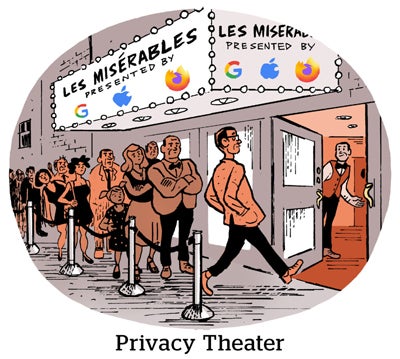Here’s today’s AdExchanger.com news round-up… Want it by email? Sign up here.
Who Wants To Play Monopsony?
This week, a US judge blocked a merger between Penguin Random House and Simon & Schuster, two major publishing houses.
You may ask, why is a print publishing merger relevant?
Partly because it’s another example of legacy businesses merging because they can’t compete with the scale of Amazon, Google or Apple, only to be denied. Outbrain and Taboola were nixed because, apparently, how could anyone compete with that? Lol.
The Kroger and Albertsons grocery merger will face antitrust review and fits the same mold.
But the book publisher case is also notable because the Justice Department Antitrust Division won it on grounds of monopsony. (A monopoly is when one company owns the supply of a product, whereas monopsony is control over demand, such as Penguin Random House Simon Schuster controlling book distribution and contract prices for authors.)
The DOJ and FTC are revamping their merger enforcement standards this and next year, and emphasize they want to tackle more monopsony cases. Historically, monopolies are the main attraction for antitrust.
Google and Amazon are monopsony targets, though, since they channel a high percent of online ad dollars, thus controlling demand in the space.
Bandying Theories
It is not a new critique of soft-science or liberal arts academic research that professors tend to focus on abstract and theoretical questions.
Even in marketing research, which is naturally more business-facing than, say, philosophy, the predominant research follows this progression: introduction → prior literature → overarching theoretical framework → hypotheses → empirical test → discussion. That’s the methodology behind “theory-first” research.
But a group of business school professors propose in the latest Journal of Marketing that academics shift to an “empirics-first” approach to marketing. (Check out their summary at the American Marketing Association blog.)
It sounds like a small change – theory to empirics. But it’s a big lift.
“One possible reason is that TF research is well-represented in PhD education and uses a series of well-defined steps while EF research, which tends to be open-ended and unstructured, appears to lack rigor,” according to the authors.
They suggest researchers begin not with a theoretical hypothesis but with a real-world issue or instance that can be broadened through empirical study. The research contribution (the attribution, if you will) should be tied to whether the research “advances understanding.”
The Missing Link
The earnings dynamics for social media influencers often depend on the platform where they have the most engagement.
If you’re big on YouTube, you’re likely making real money from rev shares, either enough to get rich or run a steady, reliable business. If you’re hot on TikTok or Facebook and/or Instagram, you’re making incremental change with an occasional viral post that could pay off hundreds or thousands of dollars (though there’s also that second revenue stream, #sponcon). Twitter, Snapchat and Pinterest don’t signify, I’m sorry to say.
But what about LinkedIn?
I agree. My first response is to laugh.
But, apparently, the rise of the LinkedIn influencer who’s banking on their platform status is growing and is very lucrative, Vice reports.
With content that’s about inspiring people enmeshed in the corporate hustle (cue the anecdote about vulnerability or humble brag), LinkedIn influencers sometimes even gain their status because of how roundly mocked they are by people on Twitter and Reddit, the article notes:
“The joke is perhaps on everyone else, as many of the same people getting ripped apart on Reddit have figured out a relatively easy way to earn hundreds of thousands of dollars by spouting inspirational, if often conventional, wisdom.”
But Wait, There’s More!
How a TikTok creator’s fake Pepsi ad led to multiple brand partnerships. [Ad Age]
Marketers can’t stop chasing ‘authenticity,’ whatever that means. [Digiday]
A case for empirics-first approaches to academic marketing research. [AMA]
Integrating a Media Mix Model into a digital marketing workflow. [Mobile Dev Memo]
As Netflix dives into advertising, media buyers watch the clock. [Marketing Brew]
You’re Hired!
Mirriad names Karen Magnani VP of sales, US. [release]














